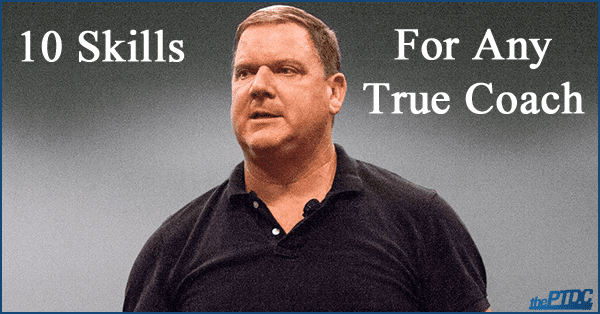The following article is by Dan John. His brand new book Before We Go: An Ongoing Philosophy of Lifting, Living and Learning is available now.
Coaching is an art and a science. How to be a good coach balances the skill set of a used car salesman, a ship's captain and a cable TV comedy show host.
Knowing what you're doing is part of the battle. Implementing the right thing(s) to do is where the real art begins. And, not to forget, even the perfect plan has to be flexible enough to turn and change on the whims of life, the universe and everything else that may come up.
I have a few principles that keep me from losing most of my mind. Here's the 10 skills any coach must balance:
1. Constant Assessment
Certainly, there are formal tools for assessment and they have great value. We can measure practically everything about you with standing long jumps, the FMS, heart rate tests and all of the rest. True coaching is constant assessment.
It's hard to grasp. When something simply doesn't look right, you need to address it quickly and correctly even if you don't have the exact problem sorted out yet. That's why as a good coach you never stop learning.
2. Constant Upgrading
Whether it's books for personal trainers, articles, workshops or sitting in a bar, good coaches are always looking for a better way...a clearer path. Discernment is a rare skill, but the ability to pick and choose "better" among a host of options takes more time than any of us have in a typical lifetime. You need to trust others to carry some of the load of discernment for you.
3. Ignore Perfect
Oh, I know your aunt is waiting to get in shape until the perfect diet and perfect exercise plan is finally here. Every time I go to a party, people with a year's supply of calories in both hands will ask about the dangers of bacon, wine or coffee.
I strive for two things:
- pretty good.
- better.
As long as we start off in this direction and gather in ideas, equipment and materials that are "better," I think we're going to be okay.
4. This Isn't Moral Theology
This marches hand and hand with "Ignore Perfect." Don't label equipment or exercises as good or bad. There's a time for everything under the sun, but maybe not today. An injury will change exercise selection, loading and repetitions, but it is what it is.
There is a time for planks and a time for explosive work. Carbs have great value, and sometimes we might want to eat less of them. But, it's not good or bad, it just is.
This is the single hardest topic for young coaches to grasp.
5. Everything Works
This is a tough one too. Every idea, every new thing and every old and moldy concept works. There's a part two to this:
When you fall in love with a new thing"”the answer to all of our problems"”circle the calendar on Monday of Week Seven. This is the day you will discover, in perfect clarity, that "Everything works."
When you build a career, you'll find lots and lots of six-week periods. Use each and every new idea, but remember Number One: "Constant Assessment." Did it get you closer to your goal? That leads us to the great next principle.
6. Achieving a Goal Versus Success
This is the most important point I push on my athletes. You can get a goal and still be a failure in life. So, be sure your genetics, geography and social life align to be the foundation of your goal focus. As you march toward the goal, insure that you enjoy the travel, the friendships and the learning"”these are as important as this "bell" you might want to ring down the road.
Certainly, attack and achieve your goals. But enjoy the process and the fruits too.
7. After the Peak Is the Cliff
Mark Reifkind taught me this one. Goals and goal achievement are great, but...now what? As you climb the ladder to success, take a moment to plan what you're going to do at the top!
And then think about the route down.
8. Self-Discipline Is a Finite Resource
I use friends, family and everyone I can find to support me on the trip toward my goals. The more communal you can make your goals, the less you have to stress and strain and choke your own free will. It's much easier to show up and train with ten people than it is to strive to push yourself out the door day after day.
9. Fundamentals Trump Everything Else
The master is the one who masters the basics. Yes, it is that simple.
10. Take a Moment to Appreciate Those Who Came before You
Thank your folks, thank your coaches. They won't be around forever.
Leave a legacy and make a difference.









